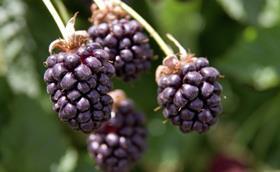
New research suggests regular boysenberry consumption may improve lung function.
Previous studies have found lung function can be improved by consuming fruits containing high levels of antioxidant compounds known as polyphenols, although the underlying mechanisms behind this are largely unknown.
Through their investigations with berryfruits, scientists at Plant & Food Research, working in collaboration with the Malaghan Institute of Medical Research, have made new discoveries on the role polyphenols play in reducing symptoms associated with the inflammation of the airways, which can cause conditions such as asthma.
The research examined two key agents associated with regulating lung inflammation: arginase, closely linked with decreased inflammation in asthma; and matrix metalloproteinase-9, associated with improved tissue remodelling.
“We’ve seen some really exciting results from this recent study,” said Plant & Food Research science group leader, Roger Hurst. “Our results suggest that boysenberry consumption may help protect the lungs and associated airways from the chronic buildup of damaged and scar tissue. These agents appear to support an environment capable of reducing scar tissue deposits on the lungs.”
The research also observed structural improvements in the lungs through the activation of specific immune cell types, which are known to assist tissue repair and retention of normal lung function.



